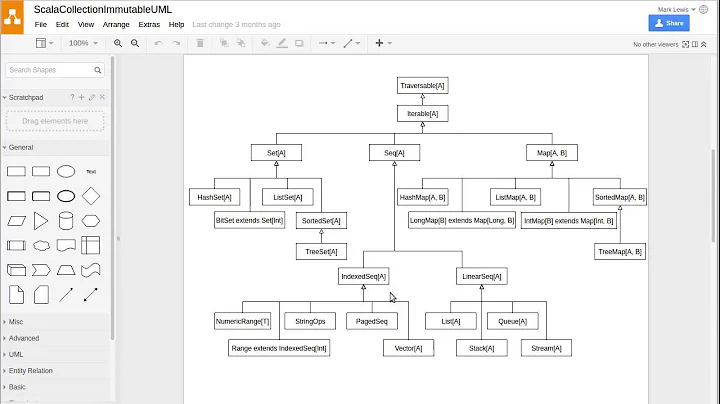How to get a random element from a Set in Scala
Solution 1
convert into Vector and get random element from it
scala> val fruits = Set("apple", "grape", "pear", "banana")
fruits: scala.collection.immutable.Set[String] = Set(apple, grape, pear, banana)
scala> import scala.util.Random
import scala.util.Random
scala> val rnd=new Random
rnd: scala.util.Random = scala.util.Random@31a9253
scala> fruits.toVector(rnd.nextInt(fruits.size))
res8: String = apple
Solution 2
So, every answer posted before has complexity O(n) in terms of space, since they create a copy a whole collection in some way. Here is a solution without any additional copying (therefore it is "constant space"):
def random[T](s: Set[T]): T = {
val n = util.Random.nextInt(s.size)
s.iterator.drop(n).next
}
Solution 3
Drawing inspiration from the other answers to this question, I've come up with:
private def randomItem[T](items: Traversable[T]): Option[T] = {
val i = Random.nextInt(items.size)
items.view(i, i + 1).headOption
}
This doesn't copy anything, doesn't fail if the Set (or other type of Traversable) is empty, and it's clear at a glance what it does. If you're certain that the Set is not empty, you could use .head instead of headOption, returning a T.
Solution 4
You can directly access an element of a Set with slice. I used this when I was working with a set that was changing in size, so converting it to a Vector every time seemed like overkill.
val roll = new Random ()
val n = roll nextInt (fruits size)
fruits slice (n, n + 1) last
Solution 5
Solution1
Random way ( import scala.util.Random )
scala> fruits.toList(Random.nextInt(fruits.size))
res0: java.lang.String = banana
Solution2
Math way (no imports)
scala> fruits.toList((math.random*fruits.size).toInt)
res1: String = banana
Related videos on Youtube
elm
Updated on June 03, 2022Comments
-
elm almost 2 years
For any given set, for instance,
val fruits = Set("apple", "grape", "pear", "banana")how to get a random element from
fruits?Many Thanks.
-
Ashalynd almost 10 yearsYep, Set should be converted to container that supports accessing elements by sequential number. Vector is quicker than List.
-
Kigyo almost 10 yearsIndexing is
O(n)on List. Why not useArrayorVector? -
 Govind Singh almost 9 years@dividebyzero previously it was set
Govind Singh almost 9 years@dividebyzero previously it was set -
justinhj about 8 yearsThis is a better answer for the reason you put forward. It could be done in a one liner like this: val s = Set(1,2,3); s.drop(random.nextInt(s.size).head
-
Rok Kralj about 8 years@justinhj: Nope, your solution is O(n) space again, since
droponSetcauses a set with the remaining elements to be created. You have to use iterators, because they are non-strict. -
durai over 7 yearsGood solution. Its worth pointing out that if the set is empty
it.nextwill throw. -
Jus12 about 7 years@AntonyPerkov which makes sense because ... what does it mean to sample from an empty set?
-
 Brian McCutchon about 7 yearsThis is still O(n) time, though.
Brian McCutchon about 7 yearsThis is still O(n) time, though. -
kkessell over 6 yearsYes, I also look for a O(1) time and O(1) space version
-
Rok Kralj over 6 yearsYou will have to create your own Set implementation for that. and the time will probably be O(log n) if you want to have other operations efficient.
-
 Boris over 6 yearsChained List is not a good option to pick one element at random. Chose array or vector instead
Boris over 6 yearsChained List is not a good option to pick one element at random. Chose array or vector instead -
Tim Barrass over 6 yearsCan't scala.util.Random.nextInt occasionally return negative numbers?
-
László van den Hoek over 5 years@TimBarrass
nextInt()will return a negative number half of the time, butnextInt(n: Int), which is used here, starts at 0 and ends atn(exclusive): scala-lang.org/api/current/scala/util/… -
 Abhijit Sarkar over 5 yearsOr convert to
Abhijit Sarkar over 5 yearsOr convert toIndexedSeq, and code to interfaces.






